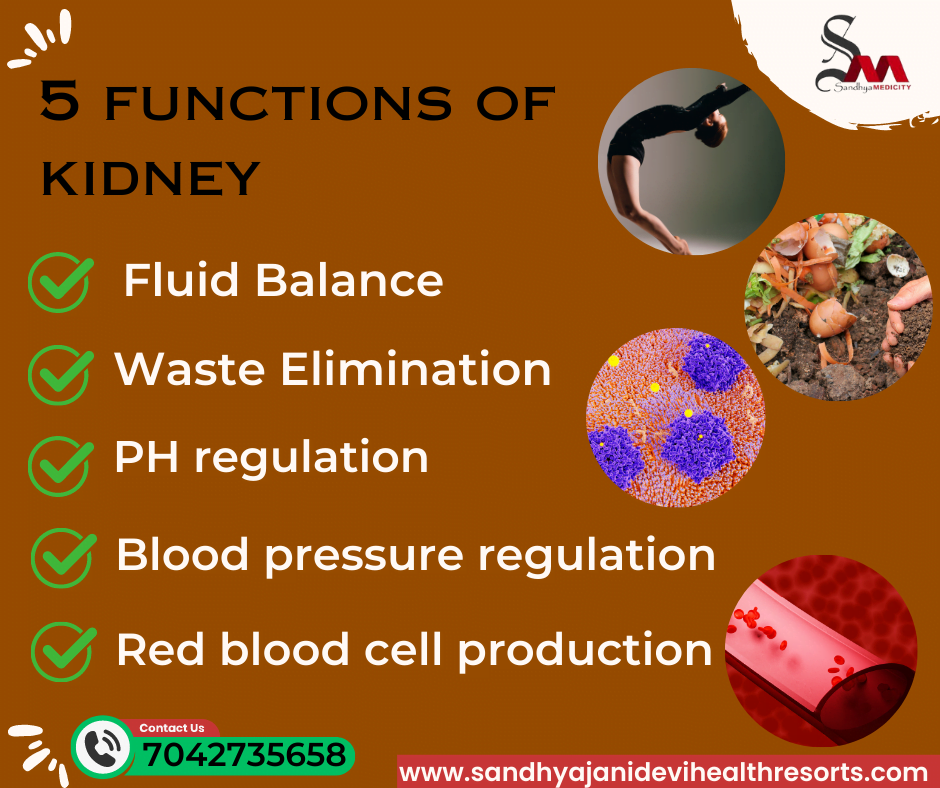Where we delve deeper into the field of human anatomy and physiology, we will delve into the incredible world of the kidney. 5 functions of kidney Specifically, we will discuss five important functions performed by these remarkable organs. The complex complexity and importance of the kidney

1. Fluid Balance
Our first function focuses on maintaining the delicate fluid balance within our bodies. The kidneys play an extraordinary role in filtering waste products, excess water and electrolytes from the bloodstream through millions of tiny filtration units called nephrons.
By selectively reabsorbing important substances such as
- Water
- Sodium
- Potassium
and chloride into the bloodstream and excreting the rest as urine, the kidneys help regulate the amount and composition of our bodily fluids, thereby preventing dehydration or dehydration. Fluid overload can be prevented.
2. Waste Elimination
In addition to maintaining fluid balance, another important function of the kidney is waste elimination. Imagine your body as a busy factory, constantly producing waste materials that must be efficiently removed.
The kidneys act as the final waste management system, filtering toxins such as urea, uric acid and creatinine from the bloodstream. These waste products are then carried to the bladder, ready to be passed out of the body as urine.
3. PH regulation
Our bodies function optimally within a narrow pH range, and the kidneys have an extraordinary ability to regulate this delicate balance. By selectively reabsorbing or excreting hydrogen ions and bicarbonate, the kidneys maintain an acid-base balance vital to our survival.
This complex process ensures that our blood and body tissues maintain a stable pH, allowing our various organs and systems to function efficiently and effectively.
4. Blood pressure regulation
Prepare yourself for this surprising revelation: Our kidneys have a real impact on our blood pressure! This is true! Acting as master regulators, these organs help control blood pressure by adjusting the amount of blood in circulation.
When blood pressure drops, the kidneys produce a hormone called renin, triggering a chain of events that eventually increases blood volume and raises blood pressure. On the other hand, when blood pressure becomes dangerously high, the kidneys will eliminate excess fluid and salt to reduce the pressure and protect vital organs.
5. Red blood cell production
The kidneys are involved in red blood cell production. Within these incredible organs, a hormone called erythropoietin is produced.
This hormone travels to the bone marrow, stimulating the production of red blood cells, which are essential for carrying oxygen to all parts of our body. Without this function, our tissues would starve, leading to fatigue, weakness, and potentially life-threatening complications.
Conclusion:-
The amazing, multifaceted 5 functions of kidney. From fluid balance and waste elimination to pH regulation, blood pressure control, and even red blood cell production, these organs work tirelessly to keep our bodies in perfect harmony.
It is truly remarkable how these simple-looking bean-shaped organs can perform such complex functions. So, the next time you drink a glass of water or enjoy a nutritious meal, remember to thank your kidneys for the remarkable work they do.

